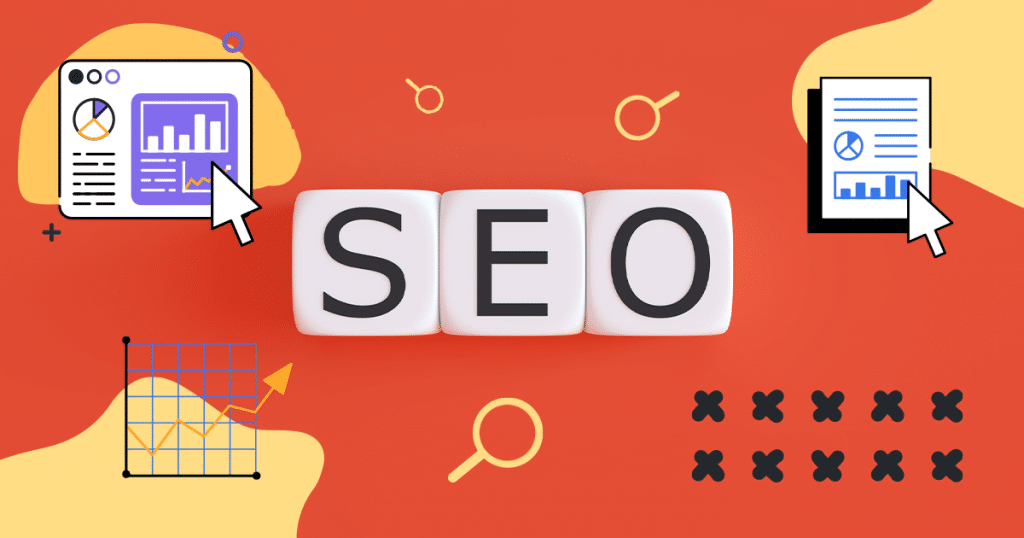Traffic and exposure are the main achievements that SEO makes possible.
But, like any other kind of data, SEO data can support decisions and answer questions about marketing and the business.
Understanding the different types of SEO data is the first step to using this information strategically.
There are many gains that marketing teams can make by taking an analytical look at this data.
For this reason, we will take a closer look at this subject, covering the following topics:
What’s SEO Data?
SEO data is data related to traffic, impressions, page rank, and other topics directly linked to SEO.
You can obtain these numbers and results in ordinary analysis tasks. So, what makes it SEO data is the type of information.
The number of impressions you receive on a PPC link, for example, is SEO data. We can say the same for the amount of organic traffic you got on a page on your blog.
SEO data helps you understand the qualification level of the web optimization strategies you apply to websites and content.
However, the main point that marketers don’t always explore is how to use SEO data beyond SEO.
Let’s think about a very common example: you have content that ranks well for keywords, you get a lot of traffic to it, but it doesn’t generate any conversions.
In this example, you can access two different SEO data (traffic volume and conversions) and, then, understand a marketing problem: conversions probably don’t happen because, despite being SEO qualified, the content doesn’t deliver value.
We can understand from the example that SEO data solves much more than ranking and traffic problems.
This information can be the basis for many other essential decisions in marketing strategies.
Types of SEO Data
A better understanding of SEO data gives you an insight into the category of information.
In addition, you will also start to realize how this category of data can be relevant, not only to SEO but to digital marketing strategy in general.
These are the main types of SEO data. Check it out!
1. Organic traffic
Organic traffic is the volume of access your website gets naturally through a search performed on search engines.
Of course, there is no type of PPC ad in these cases. The clicks are the result of continuous and qualified SEO work.
Organic traffic happens when you do site optimization, on-page SEO, and master and apply basic SEO concepts while tracking results.
2. Organic impressions
Organic impressions mean the number of times your content has appeared to users.
Sometimes you may rank for a keyword but stay on the second page of Google’s SERP, which doesn’t bring your content to the user’s screen.
In organic impressions, that person literally saw your content in the results, which was possible without any paid strategy.
3. Organic rankings
Organic rankings mean the number of times Google ranked your content for a specific keyword in an organic way.
Google SERPs show results in two parts: paid ads at the top and then organic traffic.
If your content is qualified, if there is good SEO work, and if you have chosen the right keyword, then it is likely, your content will get many organic rankings.
4. Backlinks
The more backlinks your site has, the better it will rank in Google. That is why the number of backlinks is important SEO data.
Backlinks are one of the main parameters Google considers for ranking pages on the SERP.
Of course, these backlinks are even more valuable when they come from pages with related content and especially from pages with good domain authority.
5. Keyword monthly search volume
This is the number of times users in a month search a given keyword.
This data can help you understand the level of interest people have in a certain subject or product.
In addition, you can check variations between months, cities, countries, and several other factors.
Undoubtedly, this category of data makes it possible to understand more about the target audience’s behavior and recent interests.
6. Referring domains
These are the sites where you get your backlinks from.
It is quite common to have more backlinks than referral domains. After all, you can have more than one backlink from the same site.
So, only the number of sites you backlink from is counted.
It is important to note that it is good to have plenty of referral domains, but it is even more important that these sites have good domain authority.
7. Page speed
Page speed is the loading time of a web page.
In other words, it is the period in which all content appears on the screen of users who access it.
This data has great value not only in terms of ranking but also in the experience users have.
If your page speed is slow, you will lose engagement with users, consumers, and prospects.
No matter how great your company is, how good your products are, and how low the price, a slow page speed affects the user experience and can drive people away.

How is SEO Data Valuable for Businesses?
You can get a lot of insights and solid information from your business SEO data.
These data show you more about your audience, the engagement capacity of your content, and how to improve your marketing and SEO strategies.
To achieve these advantages, you will need to take an analytical view of these results.
Below we show you how valuable SEO data can be and how to use it for your business.
Branding
Branding is essential for your company to stabilize the brand and to make it a priority among consumers’ options.
With the digital environment bringing dynamism to the market, consumers dictate many trends based on their preferences.
Therefore, knowing how to use this will help in the branding of your business.
SEO data makes it possible to understand what topics and products people are interested in, and from this, you can better invest in these options.
Browsing activities of the target audience and how this generates traffic and accesses to your site is essential to base strategies on.
Your branding efforts will be better able to reach these people and generate engagement.
Finding best keywords
You need to invest in many keywords when planning your content strategy.
The challenge, however, is to find out which of these terms is most likely to attract traffic and generate conversions.
SEO data shows marketers the most recurrent keywords and all the information regarding intentions and search volume.
From this data, it is possible to find the best keywords and know how they relate to user intent. This is because each search term is related to an intention.
For example, people who search “the benefits of marketing tools” are still at the top of the funnel, while those who search “how to choose a marketing tool” are already at the bottom, on the verge of consumption.
By understanding which of these keywords have the highest incidences, you can plan to use them at different funnel stages.
This activity is only possible because SEO data is available.
Building a better user experience
Searches for certain keywords are always linked to intent.
If you create a content ranking for “the five best SEO strategies“, it is crucial to deliver value. Regardless of how you do this, the content format you choose may not be the best.
When this happens, you can quickly detect it, thanks to conversion data.
If you get a lot of hits on your content but have few conversions, maybe the choice, or even the quality of content, was not the best.
The ideal is always to use this data analytically so that your business will always be able to capture interesting insights and, based on those, make strategic optimizations.
How to Collect SEO Data?
To collect SEO data, you need the best available tools.
Get to know each of the main ones a little better and understand how they can help you in this task!
Google Analytics
Analytics needs no introduction, and it is an ideal data analysis tool.
With it, you can monitor all the data you need, including SEO-related data.
Pagespeed Insights
As the name suggests, Pagespeed Insights is an important tool that will help you monitor page load times.
As you have already seen in this content, this is an essential metric not only for SEO.
Moz’s domain authority tool
Your site’s domain authority is another essential SEO data, and Moz’s tool is today’s main one.
The company also created the domain authority indicator.
Wrap Up: SEO Data Can Be Very Valuable
The numbers that SEO data provides help you improve marketing strategies and user experience.
In this context, understanding whether your company’s SEO work has reached a good level of maturity is key to knowing what to expect from the results.
If you want to evaluate this, check out our free SEO maturity assessment!


![[WA] Ultimate Content Marketing Kit](https://rockcontent.com/wp-content/uploads/2022/08/Content-Marketing-Kit-750x200px.jpg)



![[ROCK NA] [EBOOK SEO] Complete Guide](https://rockcontent.com/wp-content/uploads/2024/06/banner_Search-Engine-Optimization.png)






